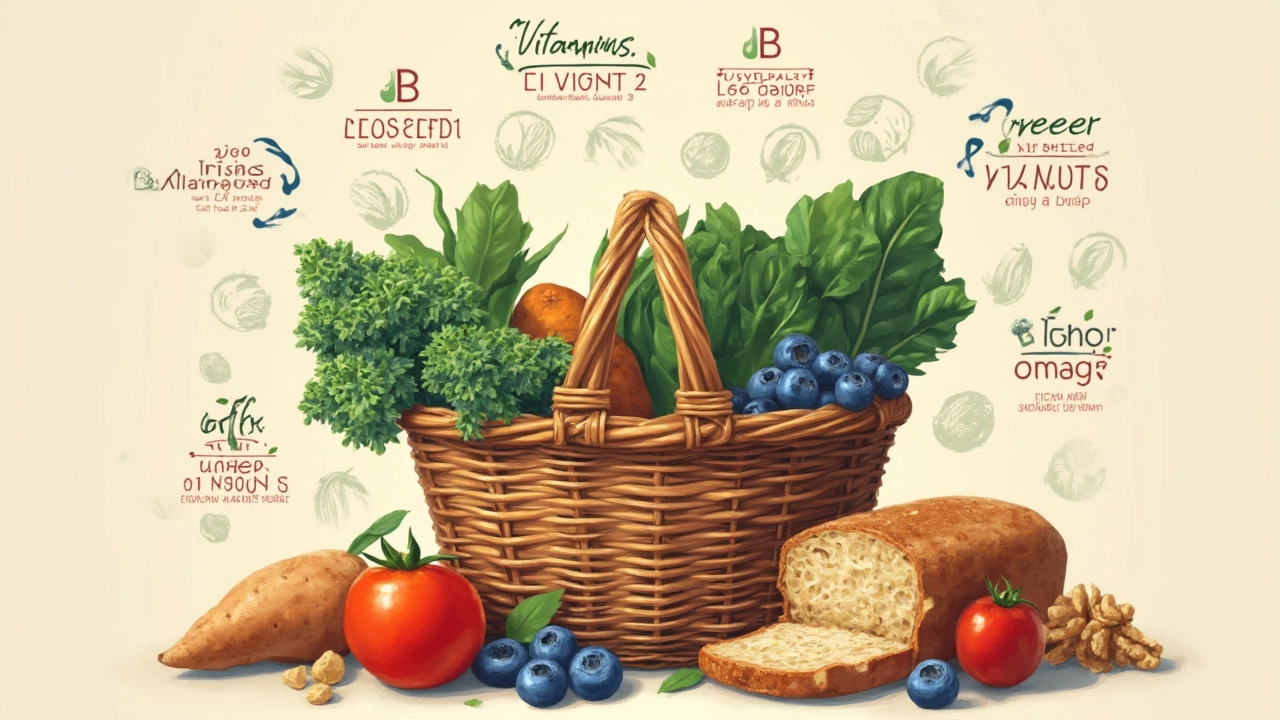Imagine protecting your memory and mental sharpness just by making smarter food choices. Dementia is a word that rattles almost everyone, but what if your next trip to the farmers market could make a real difference? Science is zeroing in on plant-based diets, showing that the right mix of veggies, fruits, nuts, and seeds could help keep your brain fired up well into old age. No magic pills, just regular foods with incredible potential.
Why Your Brain Loves Plant-Powered Nutrition
There’s plenty of buzz about gut health, but not enough people are talking about the direct connection between what you eat and how your brain ages. Researchers have shown that people who eat mostly plant-based diets benefit from fewer inflammatory markers and improved blood flow to the brain. These two things make a pretty strong case for dinner plates piled high with colorful produce instead of processed foods. Have you heard about the Mediterranean diet? It’s a big name because it slashes dementia rates by swapping processed snacks for leafy greens, tomatoes, berries, and olive oil. In fact, large population studies from places like Spain and Italy where these diets are common report much lower dementia rates than places relying on more processed fare.
What makes plants so powerful for your brain? For starters, they’re bursting with polyphenols, which are antioxidant compounds proven to fight brain inflammation. Chronic inflammation isn’t just a pain in the joints – it’s one of the silent drivers behind memory loss and dementia. Add in fiber, which helps your gut bacteria thrive. Some studies even link a diverse gut microbiome with sharper thinking. There’s also vitamin E in nuts and seeds, folate in leafy greens, lutein in avocados, and healthy fats in flaxseed and walnuts. Each nutrient offers its own boost, but together they become a powerhouse of neuroprotection.
Giving up meat entirely isn’t necessary. The real secret is upping your percentage of whole, plant-based foods. Think of it as flipping the ratio: more peas, less pepperoni. People who stick to a mostly plant-based diet often have lower rates of cognitive decline, and this isn’t just wishful thinking. A 2021 meta-analysis in the journal Neurology tracked thousands of older adults and found that those eating the most greens scored significantly better on memory tests than those who preferred meat-heavy diets. The science is unfolding fast, but the everyday impact is already clear: filling half your plate with plants at every meal could be one of the most important decisions you make for your brain.
The Neuroprotective Nutrients You Need
Let’s get specific. You want to arm your brain with the best defense possible, and that means loading up on certain nutrients. Here’s a closer look at the plant-powered stars:
- Polyphenols: These antioxidants are found in berries, dark chocolate, coffee, tea, and red grapes. They reduce oxidative stress – think of them as your brain’s shield against daily wear and tear.
- Vitamin E: It’s in sunflower seeds, hazelnuts, almonds, and even spinach. This vitamin helps slow cognitive decline by protecting nerve cell membranes from damage.
- Folate: Crucial for neurotransmitter production, folate hides in beans, lentils, leafy greens, and asparagus.
- Omega-3 Fatty Acids (ALA): Walnuts, flaxseeds, chia seeds, and hemp seeds are the plant options, and while they contain ALA rather than fish-sourced DHA/EPA, recent research shows people who get their omega-3 mostly from plants still see memory benefits.
- Lutein and Zeaxanthin: These carotenoids are what make kale and spinach so green. They boost processing speed and memory, especially as you age.
- Vitamin C: Oranges get the press, but kiwi, strawberries, and bell peppers actually give you more per bite. Vitamin C fights off oxidative damage and supports overall vascular health, which means better blood flow upstairs.
- Flavonoids: Found in apples, blueberries, onions, and parsley – these yellow and blue plant pigments lower your risk for cognitive impairment, according to Harvard’s studies on thousands of adults over 20 years.
Don’t forget about magnesium and zinc, found in pumpkin seeds and beans. Both minerals help your brain send signals clearly – imagine your mental clarity as a well-lit highway with zero traffic jams. If you’re feeling details-obsessed, check out the diet to prevent dementia where you’ll find a practical rundown of top brain-protective foods and how they work.
Many people skip breakfast but this is the easiest time to add in brain support: oatmeal with blueberries, chia seeds, and walnuts is basically a memory-boosting prescription in a bowl. Or toss spinach, orange, and pumpkin seeds into your morning smoothie. You can even swap mayo for smashed avocado in your sandwiches for a double dose of healthy fats and lutein at lunch. The key is making these swaps simple and repeatable – that’s how habits stick.

Daily Strategies for a Dementia-Preventive Plant-Based Diet
It’s easy to think, “I’ll just eat more salads.” But let’s get real. The most effective diet changes are the ones you barely notice – the swaps and additions you grow to crave. Start with one meal a day, maybe breakfast, and sub in overnight oats with nuts and flaxseed for heavy, carb-loaded fare. Or build dinner around roasted chickpeas and sweet potatoes instead of steaks or processed nuggets. Remember, you don’t have to flip the switch all at once. Even a gradual shift pays off in brain resilience.
Here’s how to load your week:
- Batch-cook lentil soup or chili on Sunday for easy lunches.
- Keep mixed nuts and sunflower seeds at home and at work for healthy snacking.
- Slice pears, apples, or berries into salads for a punch of polyphenols.
- Add baby spinach to wraps, rice bowls, and pasta. It wilts into almost anything.
- Swap out regular bread for sprouted grain varieties – extra fiber, micronutrients, and a more stable blood sugar spike.
- Try meatless Mondays (or Thursdays!) and push yourself to explore new bean-based recipes.
- Bake with almond flour instead of white flour when you can.
If you like numbers, a study in the journal Alzheimer’s & Dementia found that people who ate green, leafy vegetables at least once per day had brains that looked 11 years younger than non-veggie lovers, based on cognitive testing. That’s right – 11 years shaved off your brain age for the price of a handful of spinach thrown in at breakfast or lunch.
The biggest roadblock for most people is knowing what to eat when they’re tired or short on time. Roasted edamame, peanut butter-stuffed dates, trail mix with dark chocolate, and raw veggie platters make snacking easy without reaching for the chips. You can even air-dry kale chips for a crunch with real benefits. Remember: it’s all about convenience, so prep a little in advance, and your brain will thank you in a decade.
Evidence and Real-World Success: Why It Really Works
It’s one thing to know plants support your brain. It’s another to see it in action. You can look at brain scans from studies and actually see that people who eat the most plant-based nutrients – especially polyphenols, vitamin E, and omega-3 ALA – have denser neural connections in the parts of the brain used for memory and language. This isn’t speculation. It’s visible proof.
Check out this quick comparison from a large study in the U.S.:
| Diet Type | Relative Dementia Risk Reduction |
|---|---|
| Mediterranean (plant-focused) | ~35% |
| Standard Western Diet | Baseline |
| Strictly Plant-Based/Vegan | ~27% |
Even partial shifts boosted brain health. People who “mostly but not perfectly” stuck to plant-based eating still saw major long-term benefits. No need for perfection – just more greens, more nuts, and plenty of variety.
Doctors now say that plant-based diets can actually change the way your brain ages. It’s not just about holding steady on memory tests. People following these *diet to prevent dementia* strategies report better mood, deeper sleep, and more energy as well. This isn’t just about what you lose (forgetfulness, confusion) but what you gain (mental clarity, spark, creativity).
If sticking to new habits feels tough, try changing the focus from “avoiding disease” to “boosting future confidence.” Each handful of walnuts, each cup of turmeric-spiked lentil stew, each dark, leafy salad is an act of self-care your future self will really appreciate. Brain health doesn’t happen overnight, but every smart swap adds up.







